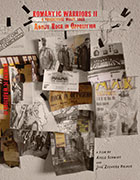
Romantic Warriors II: A Progressive Music Saga about Rock in Opposition 2012
Distributed by Zeitgeist Media, 301 Potter Lane, Rockville, MD 20850; 240-505-8696
Produced by Adele Schmidt and José Zegarra Holder
Directed by Adele Schmidt and José Zegarra Holder
DVD , color, 98 min.
Sr. High - General Adult
Music, Rock Music, Progressive Rock, Avant Progressive, Post Rock, Art Rock, Popular Music
Date Entered: 02/07/2013
Reviewed by Vincent J. Novara, Curator, Special Collections in Performing Arts, University of MarylandAdele Schmidt and José Zegarra Holder’s latest music documentary offers an engaging history of the Rock in Opposition movement (RIO), while imparting an informative overview of the Avant Progressive sub-genre of progressive rock music. Compared to Romantic Warriors (2010), their preceding effort related to the topic, this film possesses a much clearer objective and a more focused range of artists.
Avant Progressive music combines the experimental spirit and desire to push boundaries common to Avant Garde art and music with the instrumental virtuosity and longer, more complex song forms of commercially distributed progressive rock (i.e. Genesis, Rush, Yes, etc.). Steven Feigenbaum, founder of Cunieform Records, describes it as: “A huge umbrella of unpopular music that… doesn’t exclude anybody.” All of the groups examined in this documentary are very representative of this sub-genre, and are perhaps the most noteworthy practitioners.
The RIO movement was founded in 1978 by the English Avant Progressive band Henry Cow with the hopes of uniting like-minded bands that opposed the exploitive and oppressive practices of the commercial music industry. Initially, the thrust of the movement was concentrated on a festival, but quickly grew to encompass DIY ethics involving recordings distribution, international peer promotion, cooperative booking, and creative collaborations. In some ways, these DIY practices predate the highly touted punk rock ethics that mirror RIO. An exemplary and enduring example of this cooperative spirit is Recommended Records, a record label founded by Chris Cutler, the drummer for Henry Cow, that releases and reissues Avant Progressive albums.
By late 1979, after three additional festivals in different European cities, the movement had essentially ended, but its original intentions lived on in the shared efforts of the Avant Progressive bands and audience. The RIO festival resumed in 2007 in Carmaux, France with four events held over five years featuring artists from the original movement, as well as recent Avant Progressive bands. It is interesting to note that the term “RIO” is now also used as a genre identifier equal to Avant Progressive.
The story Romantic Warriors II tells is organized by the historical summaries of seminal bands in the movement presented chronologically or geographically. In addition to Henry Cow, Univers Zero (Belgium) and Magma (France) are given ample coverage and members provide significant commentary throughout the narrative. Other bands include Thinking Plague (Colorado, US), Art Zoyd (France), Guapo (England), Aranis (Belgium), and Samla Mammas Manna (Sweden). Over twenty Avant Progressive bands are interviewed or referenced, and each is represented with full lists of membership in the closing credits, which serves as a sort of encyclopedia or Who’s Who for Avant Progressive.
The documentary is constructed using diverse footage sources, both contemporary and historic. Primarily comprised of newly conducted interviews, some occur via Skype where a laptop screen is filmed. While this a resourceful way to reach artists well outside of the filmmaker’s travel itinerary, it does lead to diminished video and audio quality, including sync issues. Given the assortment of accents heard during this movie, and the degrees of fluency of spoken English, the absence of subtitles proves a genuine shortcoming, especially during the Skyped sessions. (Subtitles are provided for the excellent translations of commentary in French or Italian.) Furthermore, as the film progresses, the cheerful narration style becomes wearying, and sounds reminiscent of voice-over for an industrial training video or vacation promotion.
A highlight of Romantic Warriors II is the extensive and generous performance footage. This is especially helpful as the narrated descriptions of the music’s aural qualities are vague and ineffectual. However, the amount of performance footage more than makes up for it allowing the viewer to come to their own impressions, as well as acquire a solid understanding of the shared traits between artists, and those factors that render individual artists unique. The use of written music by the bands is evident in much of the performance footage, a practice that is unusual for rock music of any kind. The only criticism for the footage is that small portions appear to be second or third generation transfers from analog to digital. When this footage is expanded for the larger screen, the images are pixelated and distorted to amateurish proportions – certainly not in keeping with the fine quality seen in the rest of the documentary.
Romantic Warriors II is far superior to its predecessor in terms of scope and focus. Viewers likely will be convinced that the RIO movement is both important beyond its tight community, and sorely under-represented in the larger rock music awareness. Though, the influence of these bands is mostly insular, many contemporary progressive-leaning or post-rock bands owe a debt of gratitude to the earlier RIO bands for pushing boundaries. Overall, the movie is quite inspiring and informative for those interested in exploring the outer edges of rock music. Romantic Warriors II certainly has a place in any library supporting popular music studies.